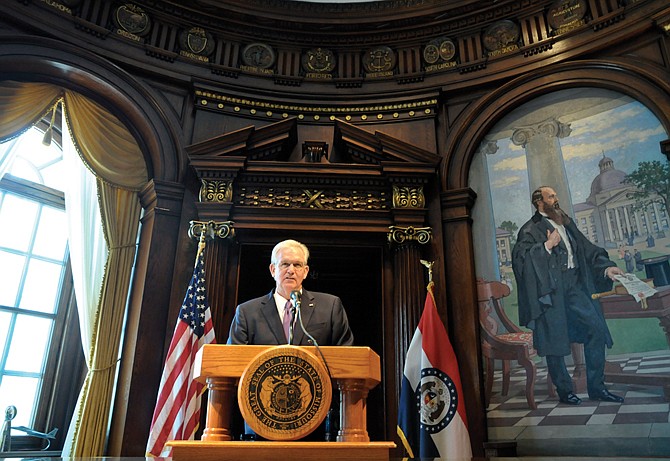Income tax cuts? No. Nullification of federal gun-control laws? No. New hurdles for public employee unions? No.
Again and again, Democratic Gov. Jay Nixon vetoed bills passed by Missouri's Republican-led Legislature that would have put a decisively conservative stamp on the state. Now Republicans who hold their largest legislative majorities since the Civil War era are poised for a showdown that will determine whether they have the political solidarity to actually enact their agenda.
Missouri lawmakers convene a session Wednesday devoted to overriding vetoes, and the itinerary is lengthy. Nixon spiked 29 bills and used his line-item veto on four additional budget items this year.
"My preference is we'd override him on everything," said House Majority Leader John Diehl, a Republican from suburban St. Louis.
"It's going to be quite a show!" added Senate Majority Leader Ron Richard, a Republican from Joplin.
In many cases, Nixon drew a sharp philosophical line. He warned that tax cuts could jeopardize education funding, the gun bill would violate the U.S. Constitution and the union requirements would burden public employees.
Missouri's GOP supermajority reflects a national trend of consolidated political power. All but four states now have single-party control of their legislatures, the highest amount in three decades. And almost half the states now have legislatures in which one party holds enough seats to override vetoes without help from the opposing party.
That political dominance creates a disincentive for compromise and the potential for legislatures to dramatically reshape public policies. But that holds true only if the newly enlarged majorities don't splinter into factions, pitting moderates against conservatives or liberals.
In the Missouri House, every single Republican must vote in lockstep for the GOP to gain the two-thirds majority needed to override vetoes. In the Senate, Republicans have one vote to spare on veto overrides.
"A caucus will rarely vote completely as a bloc. Having just enough makes it more difficult," said Karen Shanton, an analyst at the National Conference of State Legislatures who focuses on supermajorities.
Missouri and Arkansas are the only states with a governor of one party and a Legislature with a veto-proof majority of another party, she said. Arkansas' GOP-led Legislature overrode three of the six vetoes issued this year by Democratic Gov. Mike Beebe - two measures imposing additional abortion restrictions and one enacting a voter photo identification requirement.
The fine line on Missouri's legislative supermajority already is creating complications for Republicans leaders. Nixon vetoed their marquee legislation cutting income taxes for individuals, business owners and corporations. Now several GOP House members have said they plan to vote "no" on a veto override, echoing Nixon's concerns that it could tear a hole in the budget and - due to a drafting error- impose sales taxes on prescription drugs.
Yet Republican leaders are still pressing for a vote on the tax cut and numerous other bills.
"What's the use of having a supermajority if you don't use it and flex your muscles?" asked Richard, a former House speaker.
Missouri House Speaker Tim Jones, R-Eureka, has boldly predicted that lawmakers "may be able to override an historic number of bills."
Missouri's high mark for veto overrides occurred in 1833, when a different constitution required only a simple majority for an override. The Legislature overrode a dozen vetoes of bills granting divorces to couples - a duty no longer ascribed to lawmakers.
Since then, no more than three vetoes have been overridden in any year. That occurred in 2003, when the newly minted GOP majority teamed with some Democratic defectors to override Democratic Gov. Bob Holden's vetoes of two pro-gun bills and an anti-abortion measure.
This year's vetoed bills include one that seeks to nullify any federal measures "which infringe on the people's right to keep and bear arms." The bill allows state misdemeanor charges to be brought against federal authorities who attempt to enforce those gun laws and against anyone who publishes a Missouri gun owner's identity. One Republican has voiced opposition to the bill, but several House Democrats have said they likely will buck their party and vote for an override - even though they agree with Nixon that the bill is unconstitutional.
House Republicans face a much steeper challenge rallying enough support to override Nixon's veto of a bill that would require public employee unions to get annual written consent before deducting dues from paychecks or using them for political purposes.
But if some of the more conservative party members prevail, Missouri Republicans also could consider overriding vetoes of legislation limiting foreign laws from being used in Missouri courts and banning policies based on the United Nations' Agenda 21 agreement on sustainable development. Another vetoed bill would bar public entities from restricting celebrations of holidays in an attempt to preserve traditional Christmas and Thanksgiving programs.
Nixon openly mocked some of the Republican measures and chastised lawmakers for fighting imaginary problems without considering potential side effects. He said the holiday bill could overturn local fireworks restrictions. And he said the Agenda 21 bill could force city councils to undertake a "bizarre and burdensome analysis" of zoning ordinances.
Despite their large majorities, some GOP leaders have begun bracing for setbacks.
"We're going to try to override him on as many things as possible, and if not, we're going to bring them back next year," Diehl said.

